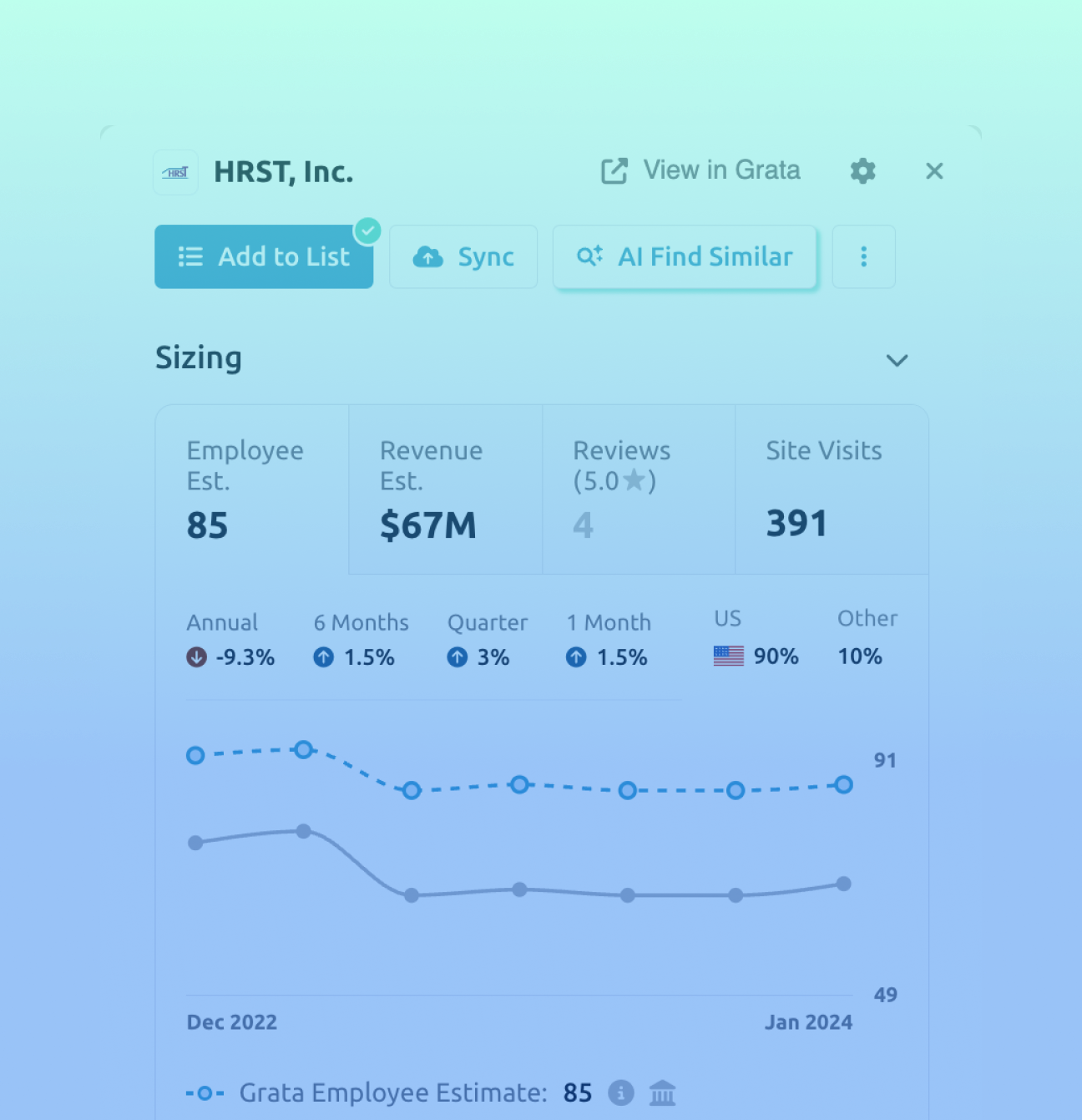The Grata team has hundreds of conversations with business development professionals a month.
We know that the question top of mind for PE is this: how do I get my business development strategy to be more proactive?
Here are some of the PE trends we've discovered and the channels that top firms are using to create proprietary inbound deal flow.
What Is Proprietary Deal Flow and Why Is It Important?
Proprietary deal sourcing is the practice of identifying and securing investment opportunities that are exclusive and unique to a particular firm.
A proprietary deal can be:
- a deal in which a given firm is the only bidder, or
- a deal in which a firm is the first of multiple bidders and has a significant advantage in terms of relationship with or access to information about the target company.
Because proprietary deals take place outside of the typical auction process, they’re more likely to save investors money.
Private equity firms that successfully leverage proprietary deal sourcing can bring in higher returns for their investors, giving them a sharp competitive edge. Additionally, proprietary deals keep funnels active even in the most competitive or volatile markets.
To successfully establish a proprietary deal flow, investors have to be able to scour the nooks and crannies of their target industry — and they have to do it before their competitors.
Strategies for Optimizing Proprietary Deal Flow
Optimizing Proprietary Deal Sourcing
Proprietary deals typically happen when a company isn’t actively in search of an investment. Instead, they come about in one of two ways:
- The investor has a personal connection to someone at the target company, or
- an intermediary or someone from the PE firm directly approaches a company that matches the firm’s investment strategy.
But there’s only so far dealmakers can get by relying on personal connections and intermediaries. To maximize their results, firms have to integrate tech solutions into their proprietary deal sourcing and management processes.
Solutions that equip investors with unique data and AI-powered workflows provide visibility into traditionally opaque private markets. These deal sourcing tools help private equity firms reach a larger number of potential deals and analyze internal and third party data on a much larger scale. They also provide tracking tools to manage the deal pipeline and workflows that improve the probability of achieving the desired outcome.
For example, Grata’s AI-powered deal sourcing solution allows investors to quickly search through over 12M difficult-to-find middle market companies with purpose-built filters, including software classifications, revenue, ownership, funding, and more. The Similar Companies tool uses AI to identify themes and suggest other relevant companies, showing users a larger pool of potential targets.
Grata’s AI analyst, Ana, helps dealmakers perform desktop diligence to determine if a possible target should be approached. If you want to reach out, Grata’s platform provides up-to-date contact information for company executives.
Streamlining Deal Flow Management
Building and maintaining consistent deal flow requires dealmakers to optimize their pipeline management processes.
Grata’s Pipeline Management tool organizes investors’ deals so that they know exactly where each relationship stands. In the Grata platform, dealmakers can:
- Create custom labels that match their deal process
- Document their interactions to track important callouts and collaborate with their team
- See their pipeline all in one place
- Export their data directly to a spreadsheet
Additionally, the Grata platform lets dealmakers seamlessly sync companies to their CRM. With Grata’s CRM Intel, investors can leverage their firm’s proprietary data from Salesforce, DealCloud, or HubSpot to uncover more deal targets. Users can access their CRM data directly in the Grata platform so they can identify top-scored deal targets and focus on cultivating the most promising opportunities. By unifying CRM data with market and company intelligence, firms can shift from reactive tracking to intentional relationship development - prioritizing the right conversations at the right moment, maintaining continuity across long deal cycles, and building trust long before a transaction is on the table
Maximizing Private Equity Deal Flow
Proprietary Inbound Defined
Currently, private equity (PE) business development teams face a false dichotomy when it comes to deal sourcing. They think the options are between:
- doing proprietary outbound deals that take a lot of time and effort, or
- doing inbound deals, which are faster and easier but have lower returns.
But there is another option: proactive business development (PBD), with a focus on proprietary inbound deals.

There are 2 dimensions:
- Dealmakers are looking for higher returns.
- Dealmakers are looking to source deals efficiently.
There’s always a tradeoff, but the top firms are moving their BD teams to the top right corner with alternative deal flow channels. More channels, more diversification.
Can this really be achieved?
With PBD, yes. PBD includes the following channels.
Channel 1: Proprietary Outbound Deals
The approach to outbound sourcing varies by firm, but there are two main strategies that organizations use:
- The firm has a dedicated BD team. The structure typically looks like a Managing Director or VP with a team of 1-3 more junior professionals.
- Everyone at the firm does sourcing. In PE firms, deal sourcing is assigned to more junior professionals. In investment banking, it’s the opposite. Typically, everyone at the firm is looking for deals.
Both methods have pros and cons.
For the dedicated BD team, the negative side effect is that at some point during the deal, there’s usually a handoff process. That can make the due diligence process more complicated than if there was one single point of contact throughout the deal from start to finish.
For teams where everyone is expected to source deals, time becomes a problem. Working outbound is time-consuming, and juggling inbound and outbound priorities is difficult.
The solution: The best firms take a long-term perspective on deal sourcing. If you’re expecting to do direct outbound to CEOs and in a month have a deal, that’s not realistic. Sellers are getting more sophisticated. They know buyers are out there looking for their business. The best firms are building actual relationships with executives.
Here's an example. A CEO says they’re not willing to sell. If you stop talking to them right then and there, that's the end — nothing is achieved. If you maintain a cadence of communication, that relationship could lead to three more meaningful conversations or even referrals. But that is only going to happen with a real relationship.
This applies to dealmakers in the lower middle market and upper middle market alike. You have to build the relationship before the process because auctions in the upper middle market are becoming even more limited. You need a relationship to get to the top of the list.
Channel 2: Work with Bankers and Business Brokers
Remember our trusty 2x2 framework?
Right now, banked deals sit in the bottom right corner: easier process, but more competition. How do you systemize banker outreach in a way where deals come to you?
As PE firms become more and more specialized, you can start building relationships with bankers by sharing knowledge. Sending up the bat signal, if you will.
You want to be top of mind for sell-side bankers when they start making their Top Five Sponsors and Top Five Strategics lists. The more boutique a bank is, the harder it is for them to run a broad process. PE firm thought leadership is the way to introduce yourself and stay in touch with bankers in your space.
On average, mid-senior PE professionals have relationships with 5-10 banks. There are 6,000 investment banks in the US. How do you see the other 99%?
To get started you, need to:
1) Know who is working in spaces relevant to you. Grata's Investor Search does exactly this.
2) Put these bankers into your CRM and create a schedule to reach out. Build banker conversations into your firm’s DNA.
Channel 3: Engage with Lawyers and Accountants
Currently, there is a large number of business owners retiring. They are going to their lawyers and their accountants and making plans. Those M&A advisors are in the know.
You want to stay connected to people in the know. Similar to building relationships with executives and bankers, you need to build in quarterly check-ins with M&A advisors specifically catering to your space.
To get started, you need to find lawyers and accountants working in your industry and build relationships.
The result: A potential proprietary deal that comes directly to you. Building a referral program doesn’t happen overnight, but once it’s up and running, it’s highly lucrative.
Channel 4: Connect with Investors
Investor referrals are much more common in venture capital than in private equity.
Virtually all VC deals are proprietary. How? VCs have relationships with investors who do bigger and smaller deals than their firm. The seed investor knows the Series A investor, the Series B investor, and so on.
PE firms could benefit from similar structures with other investors.
Know investors in your industry all the way up the line. PE firms have similar chains that target different EBIDTA. Know who is investing above you and may have deals they need to pass along.
On the flip side, it’s also useful to be the investor who passes along deals to other firms that are better suited based on size.
The best firms have regular check-ins with other investors. The investors above you can give you first access to companies they pass on.
How Grata Can Supercharge Your Proprietary Deal Flow
So you want to tap into new channels to find deals. But how do you find them, and once you’ve found them, how do you keep track of them all?
Grata’s AI-powered business development hub gives you proprietary data across channels — all in one place.
Grata gives you a full perspective into markets you’re exploring with insights into fragmentation, deal data, and public comps. You can also use Company Search to identify specific targets that others miss, so you can proactively fill your pipeline with high-quality prospects.
With CRM Intel, you can leverage your firm’s proprietary data from Salesforce, DealCloud, or HubSpot to uncover more deal targets. You can also access your CRM data directly in the Grata platform so you can focus on going after the most promising opportunities.
You can even search the Grata platform to find conferences and events in your industry. Filter to see which of your contacts will be in attendance so you can make the most of your time and nurture key relationships.
To start supercharging your proprietary deal flow, schedule a Grata demo today.













